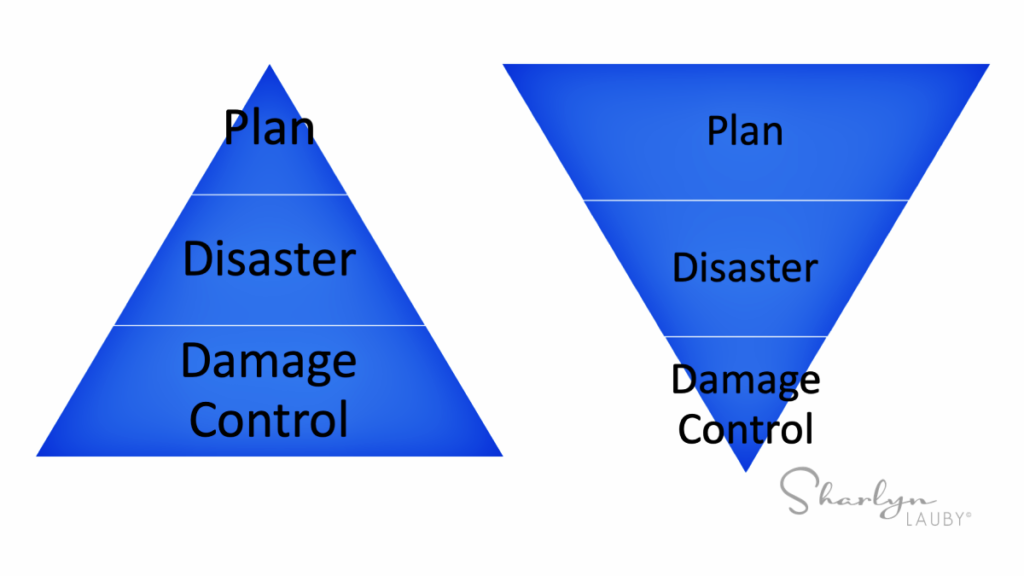
Whether you’re a freelancer or a large multinational organization, it’s important to have an emergency plan. It would be wonderful to say that we don’t need to plan because nothing bad is going to ever happen, but that’s just not very realistic.
No matter what type of business you operate, you’re going to occasionally have to deal with an emergency. It could be a natural disaster. Or maybe an accident. Possibly a scandal. Waiting until something unexpected occurs to put a plan in place doesn’t make sense and could actually cost the business more than the emergency created.
At WordCamp Orlando, one of the speakers gave us a good outline for an emergency response plan. They used it in the context of social media damage control, but I think the principles apply to any type of emergency.
- Plan! I love the pyramid image above to show the relationship between planning and response. A small amount of planning equates to a large amount of damage control. Want to reduce your exposure? Plan more.
- Detect. This reminds me of my “seeing the dirt” story. Employees at every level of the organization need to look for organizational vulnerabilities and report suspicious or detrimental activity for investigation.
- Verify. When an incident occurs, it’s important to verify what happened. In today’s 24-hour news cycle, it’s easy to get caught up in rumors and speculation. Take a moment to verify what took place. This doesn’t have to be a full-blown investigation but do make sure that what people say is going on…is really going on.
- Response. Identify in advance who the organization’s subject matter experts are. When an emergency happens, call in the specialists. They should be prepared to assist.
- Investigate. This step works in concert with #3 Verify. The verify step is to confirm there’s an emergency. In the investigation step, the organization needs to get details – who was involved, what happened to cause the incident, where did it take place, when did it happen, how did it happen, and finally why is it happening.
- Communicate. I cannot emphasize enough the value of giving the company’s spokespeople media skills training. When an emergency strikes, the community will want some sort of response. In addition, employees will want to know what’s going on. Being able to communicate effectively – internally and externally – is essential.
- Remediate. Once the emergency has subsided, the organization should conduct a debrief. Ask two questions: A) What went well? And don’t say nothing. There will be things the company does well. Even during a disaster. B) What could we do differently or better next time? Please note I didn’t say “wrong” because….
- Review. And update the plan accordingly. In the last bullet #7 Remediate, I mentioned doing things differently next time. It’s possible that the company didn’t do anything wrong. You followed your plan to perfection. But that doesn’t mean you won’t want to make your plan stronger for the next time. Because chances are…
There will be a next time.
Emergency and disaster planning can help us understand our organization. They can help employees prepare for the unexpected. And they can make our operations stronger. The time and resources we spend planning will help us at a future date. Make the investment. Your employees and your business will thank you for it.
20







Carla says
Great read, emergency and disaster management is something that organizations often ignore however, it is an essential preparedness measure for organizations